Peter MALONE
Saturday, 18 September 2021 20:01
Divine Lady, The
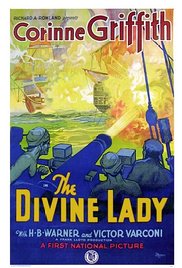
THE DIVINE LADY
US, 1929, 99 minutes, Black and white.
Corinne Griffith, Victor Varconi, H.B.Warner, Ian Keith, Marie Dressler, Montagu Love, William Conklin, Dorothy Cumming.
Directed by Frank Lloyd.
The Divine Lady refers to Emma, a country girl, daughter of a cook in the late 18th century who finds a place in the household of the Honorable Charles Greville, falls in love with him but is transferred to the household of the ambassador to the kingdom of Naples, Sir William Hamilton. It is not a love match, though he is devoted to her. When she encounters the British national hero, Horatio Nelson, she is attracted to him, later helps him in the kingdom, appeals to the Queen to sign a document for supplies for his men afflicted with scurvy, incurring the wrath of the French in the post-revolution era. Later, she becomes his mistress, especially when he returns in triumph to England after the victory is on the Nile. She is refused invitation to the function for Nelson and to be presented to the Queen. He stays with her – but responds to the call to defend Britain against Napoleon once again when he threatens the English Channel – leading to the Battle of Trafalgar.
Frank Lloyd won the Oscar for best director for this film, strong in its presentation of the relationships but also quite spectacular in its portrayal of naval battles.
Corinne Griffith, very popular at the time, was Lady Hamilton and Hungarian-born Victor Varconi was Nelson. H. B. Warner has a strong role as Lord Hamilton soon after his portrait of Jesus in Cecil B. de Mille’s The King of Kings.
Ten years later Vivien Leigh Laurence Olivier played the couple and in 1979, Glenda Jackson and Peter Finch in Bequest to the Nation.
This is one of the last of the silent films.
1. Romantic drama? Historical drama? Naval drama?
2. Black-and-white photography, re-creation of the period, costumes and decor? The locations, the English countryside and village, the kingdom of Naples and the residence, London and society, the return to the English countryside? The staging of the naval battles, the ships, the close-ups of fighting?
3. The portrait of Emma Hart, the country girl, arriving on the coach with her mother and her mother falling out, the flirting of the coachman? The disapproval of Greville? Sacking them? Emma getting in the window, the appeal? The artist Romney approving? Training Emma to be a lady, not running in the house? Her bickering with the neighbours and then smiling and shaking hands? Greville and his infatuation with her? Her falling in love? The meeting with Lord Hamilton? Greville, his finances, marrying someone else after sending Emma to Naples? Emma in Naples, further education, marrying Hamilton, though not a love match? His devotion to her? Her playing the harp, her singing? Life in Naples, friendship with the Queen? Society activities, with the dog? The French revolution, tensions with France? The 1790s, Nelson’s arrival, her compassion, the attraction? Her plea to the Queen to give a permit for restocking in the kingdoms of Sicily? The King and his hostility? The French and hostility? The siege of Naples and the riots in the streets? The return of Nelson? His staying with Emma? His being recalled to England, Emma returning, her name crossed off the list for the reception? Retiring to the country, in love with Nelson? Idyllic? His being called to service, packing and letting him go?
4. Nelson, national hero, his naval skills? The battles of the Nile, the men with scurvy, going to Naples, the plea for replenishment? Emma and the permit from the Queen? The battles against the French? His return, idyllic time in Naples with Emma? In London, his taking the side of Emma when she was shunned? In the countryside? His relationship with his wife, leaving her after triumphing through the streets with her? His response to call for battle, the Battle of Trafalgar, his being wounded, his friendship with Hardy over the years, “kiss me, Hardy”, his death? His place in the national British consciousness?
5. Lord Hamilton, ambassador, older, attraction to women, the visit to London, interest in Emma, taking her to Naples, education, her playing the harp, his proposal, his devotion to her over the years, permitting her to have the relationship with Nelson?
6. Greville, the portrait, discussions with Romney, the arrival of the Harts, his reaction, sacking them, Emma’s plea? Loving her? In society? Vauxhall, her leading the singing, his indignant reaction? Forgiving her or not? Sending her to Naples, the letters, his marrying again, the later meeting?
7. The Queen of Naples, Marie Antoinette’s sister, receiving Emma, persuading her to sign the document? The reaction of the French, her brother backing France? Nelson’s rescue of Naples?
8. Emma’s mother, falling out of the coach, curtsying, travelling with her daughter to Naples?
9. Hardy, the soldiers on the ship, naval conditions, scurvy, the need for replenishment, fighting in battles? At Nelson’s death?
10. The staging of the battles, ships, close-ups, the fighting?
11. The romantic images at the end and the status of Nelson and Lady Hamilton?
Published in Movie Reviews
Published in
Movie Reviews
Tagged under
Saturday, 18 September 2021 20:01
Tale of Love and Darkness, A
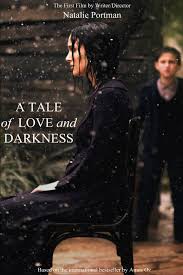
A TALE OF LOVE AND DARKNESS
Israel, 2015, 95 minutes, Colour.
Natalie Portman, Gilad Kahana, Amir Tessler.
Directed by Natalie Portman.
This is certainly a tale of love, especially a mother’s love for her son, but even more certainly a tale of darkness, a tale of depression.
The subject of the film is the Jewish writer, Amos Oz, a memoir about his childhood and his relationship with his mother and father, but especially his mother. The film opens with an older actor as Amos walking through the streets of Jerusalem in more recent times but his memory going back to the 1940s, especially the end of World War II, living in Jerusalem, the uncertainty with the Palestinians, the movement towards the State of Israel and the presence of the British and their withdrawal – and the United Nations vote in 1948 for the State of Israel.
Natalie Portman is the driving force behind the film, not only portraying Amos Oz’s mother but also adapting his memoir for a screenplay and directing the film. She brings a certain intensity to the film which is something of a grim experience even, at times, a glum experience.
Amir Tessler portrays the younger Amos Oz, the young boy who relishes stories, especially listening to those various stories told by his mother, in the film visualising them, for instance, a woman drowning and being rescued, with mother and son seen in these roles, and two monks silently wandering the desert until there is a crisis and they have to speak. Amos’ father is a literate man, writing on literature, even publishing a book and working in a library. Amos’s mother, has a strength of character, but is overcome by the situation at home, in Jerusalem, and, especially, in the British occupation and its consequences.
While the film highlights the diaspora of the Jews over millennia and the great joy in the establishing of the State of Israel (a strong scene showing the crowds listening to the radio in the streets with the countdown of the countries voting yes, the Arab countries voting no and various countries abstaining, including Britain), Finia descends into deep depression. The screenplay points out that she came from the Ukraine with her mother and sisters, has a hankering for her past life and the idealised picture of a young working man, contrasting with severity of her mother’s views, although she gets great comfort from her sisters.
The film is of interest for those who want to know more about Jewish settlement from Europe in the 1940s, in the consequences for their living in what was about to become Israel, tensions with the Palestinians (although is that there is a pleasing sequence when the young Amos befriends a young Arab girl), establishing Israel in the 1940s and the consequences.
1. An interesting Israeli film? Delving into the past? The 1940s, World War II, British occupation, relationship with the Palestinian Arabs, the State of Israel?
2. The reputation of Amos Oz, as a writer? His memoir, his relationship with his mother, 1945 to 1948, the State of Israel?
3. Natalie Portman, writer, director, star?
4. The scenes in Jerusalem, post-war, the homes, the streets, the shops, school, offices? And the recurring theme of the older Amos’s walking through the city?
5. The grim aspects of the story, the love and the darkness, even a glum tone, serious? The musical score?
6. The title, Fania’s life, the impact of her love and her darkness on her husband and Amos?
7. The story, the background to the Ukraine, having to leave the country, the recurring image of the ideal worker, her relationship with her sisters, at home, in Israel, in Tel Aviv, their visits, talking, their help? The contrast with her mother and her severity? Her love for her husband, his being a bookish man, his publication? Her love for Amos, his age? Palestine, the 1940s? A picture of a woman in depression?
8. Her loving to tell stories, the visualising of these stories – even with herself and Amos as the protagonists, the silent monks walking through the desert and their helping, the woman drowning and her being rescued? A talent in telling stories, love for literature and reading? Amos and his response?
9. The family sequences, the detail of life in the house, the rooms, meals, conversation? The difficulties with Fania and her depression and her sitting in the quiet and the dark? A loving father, very proper, his writing and research, literate, publishing, the support of his friend, although hiding the copies which were not sold? His personality, relating, trying to support his wife, developing his son? The glimpse of his being out and putting his hand on the girl – but nothing coming of this? Going out with Fania, her wanting to have an enjoyable meal, her collapsing? His response to the news of the UN count about the state of Israel? His response to Amos leaving – and his later visit to the kibbutz and riding on the tractor with his suitcase?
10. Fania, her love for literature, imagination, dealing with her illness, care for the boy, worry, the political issues, present at the listening to the UN vote, her being reserved, sitting, the doctor, going to Tel Aviv, her sisters, her death?
11. Amos, his life, his imagination, love stories, study, his friends, bonding with his father? The visit to the Palestinians, his friendship with the girl, the incident with the swing, the accident, his father and his reaction, the phone calls and recompense?
12. Jewish people at the time, their experience of the Diaspora, wanting to have a home State, the effect of the Holocaust?
13. The British, the occupation, the impact on the Jewish people, the experience of war, hiding in shelters, the boy shot playing football, the woman shot through the sheet she was hanging on the line? The British withdrawal? The possibilities for peace? The two states?
14. The scene of listening to the count and exhilaration with the UN decision?
15. The aftermath, the beginning of hostilities, Palestinians and Israelis? Seen in the hindsight of this memoir of Amos Oz?
Published in Movie Reviews
Published in
Movie Reviews
Tagged under
Saturday, 18 September 2021 20:01
Transformers: Dark of the Moon
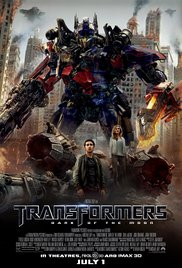
TRANSFORMERS: DARK OF THE MOON
US, 2011, 154 minutes, Colour.
Shia La Boeuf, Rosie Huntington- Whitelaw, Josh Duhamel, John Turturro, Tyrese Gibson, Patrick Dempsey, Frances Mc Dormand, John Malkovich, Kevin Dunn, Julie White, Alan Tudyk, Ken Jeong, Glen Morshower, Buzz Aldrin.
Directed by Michael Bay.
Almost universally panned by reviewers. Almost universally liked by its audiences. This third in the series made over $200,000, 000 in the US in about ten days and twice that in box office takings around the world in the same time. As they say, a popular cultural phenomenon. And, as the reviewers say, there’s no accounting for tastes.
My previous experiences of Transformer movies was thunderously loud sound. For this third one, the projectionist kept it at tolerable. A great advantage.
Another advantage by this time, with a little help from a voiceover at the beginning, is that one has learned who the Autobots are and who are the Deceptikons and what they are doing on earth and how they relate to humans. You don’t have to be a genius, only a fan of The Transformer movies (that sounds a bit mean as I look at it!), to know that the Deceptikons are up to no good. This time they don’t want merely to take over the earth and make us humans their slaves, they want to bring their planet Cybertron down here. And, after decimating Chicago, they almost succeed. (After so many destructions of New York and, especially LA, even recently in 2012 and Battle for LA, there is a certain satisfaction in seeing Chicago the victim of spectacular special devastation effects.)
But, of course, the Deceptikons, especially Megatron (voiced by Hugo Weaving) have underestimated Sam Witwicky (Shia La Boeuf) who outwitted him before. Sam is out of a job, out of a girlfriend (since Megan Fox did not have her contract renewed), pestered by his parents, and jealous of his new girlfriend’s boss. She is played by British model Rosie Huntington –Whitely who is certainly going to win on the catwalk but is in real danger of a Razzie nomination for her lack of performance. But, she gets plenty of close-ups and is in on all the final action.
The mechanically-oriented are going to be satisfied with the transformations. The action-oriented have nothing to worry about. Plenty there. The special-effects-oriented are going to be satisfied. The screenplay-as-something-one-puts-one’s-mind-to-oriented will simply give up.
Michael Bay, prone to the very big, the very loud and the very smashing in his films, and whose scrapbook of favourable reviews is still very tiny, ensures that the legion of Transformer fans will not be disappointed.
One of the interesting things at the beginning of the film is the build up during the Kennedy era of the race to the moon and then the actual Apollo 11 flight. But, even more interesting for conspiracy theory addicts, is that the flight was not simply to get there and be there but that Buzz Aldrin (who appears as himself seeming to verify what ‘really’ happened, a nice coup) and Neil Armstrong, after the famous, ‘One small step...’ actually had to spend twenty minutes examining the giant Autobot spacecraft that had landed on the moon some time earlier and which NASA wanted to investigate. Capricorn One, years ago, posited the conspiracy that the moon landing was fabricated in a studio. The forthcoming Apollo 18 is going to posit some paranormal activity. The moon landing is a ripe field for conspiracy.
The cast goes a bit more up-market this time. John Turturro is back as is Josh Duhamel. But, here we have John Malkovich and Frances Mc Dormand with substantial roles, Leonard Nimoy as the voice of the treacherous Sentinel Prime and Patrick Dempsey as a smooth villain.
It has already made millions, so who needs a review!
1. The third in Michael Bays’ series? The popularity? Box-office? Negative critics?
2. The Japanese origins, the Americanisation, the imagination, the Transformers, the humans, struggles between good and evil, US and Russia, battles?
3. The work of the director, big and loud?
4. The visuals, the Transformers, the look, size, shapes, movement, in action? The voices? Good versus evil?
5. The strong cast, for the heroics, the glamour, the military, the politics, working with the Transformers?
6. The presentation of the Autobots, the looks, shapes and sizes, voices, communications? Humorous and serious? Optimus Prime, Sentinel Prime, the other characters? The gathering, a force?
7. The contrast with the Deceptikons, the individuals, look, size, movement capacities? Their defeat? Wanting revenge?
8. The American government, politicians, officials? The Armed Forces, the commanders, going into action? The Russians? The stars and their cameos and characters?
9. The issue of the moon, the lost spacecraft, the expeditions, to find the craft, to discover the secrets?
10. Sam, from the past films, in himself, age, experience, his relationship with his parents, hopes? The new girlfriend and her glamour? Her boss and his evil intentions? Rivalries? Sam and his relationship with the Autobots?
11. The build-up to the confrontation, the Transformers, the American military? Sam and his key role?
12. American victory – and anticipation of the next sequel?
Published in Movie Reviews
Published in
Movie Reviews
Tagged under
Saturday, 18 September 2021 20:01
Citizen Verdict
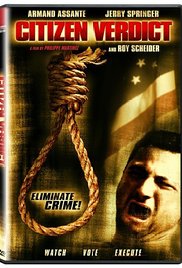
CITIZEN VERDICT
US, 2003, 97 minutes, Colour.
Armand Assante, Jerry Springer, Roy Scheider.
Directed by Philippe Martinez.
This film has a huge problem to confront before it starts:
- How do you make a reasonable film about sensationalism without succumbing to what you are attacking?
- Do you make a subdued documentary?
- Do you take the risk of glamourising the target?
- Or, do you indulge in doing a bit of sensationalising yourself. Citizen Verdict tends towards the last.
While Armand Assante is the star, the co-star is, of all people, Jerry Springer, the speech-writer, Mayor of Cincinatti, who has become king of the daytime talk shows with his no holds barred technique and the seemingly outrageous topics that he encourages on his show. This is sensational enough. Plus, he plays a television producer who is the end in sensationalist programming, who is ruthless, plays politics, is cutthroat in whom he employs and fires and whose personal life is couching-cast oriented. One thinks he must have a great deal of front to take on this role.
Reality shows have become the staple of network programming with the success of shows like Big Brother and Survivor and the myriad imitations. Already in Series 7 - The Contenders, we had a film that portrayed a reality show where the winner had to kill off every competitor. Death is the ingredient for Citizen Verdict and, given the US propensity for talk shows, the plot seems not altogether impossible.
The idea is to have a trial, lasting three hours, on television with a judge, a prosecutor and a defence lawyer (all on the payroll) who will try an actual criminal on death row. The verdict is the Citizen Verdict where people phone in their judgments and the accused is found guilty or not guilty according to the popular poll. Already polls dominate opinion around the world and here is one, sanctioned by the Florida government (with Roy Scheider as the governor and backer of the TV show for ratings, profit and votes) on a matter of life and death.
The idea is very interesting given television trends. The screenplay shows the tactics and techniques of the competing lawyers and the behind the scenes machinations with the truth for more sensational television. The climax of an execution on TV and the subsequent wheeler-dealing for control of the show leave a nasty taste in the mouth - which is what the film-makers were trying to do.
Published in Movie Reviews
Published in
Movie Reviews
Tagged under
Saturday, 18 September 2021 20:01
Freddy vs Jason
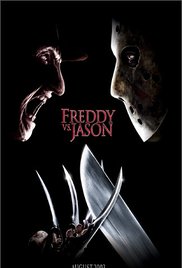
FREDDY VERSUS JASON
US, 2003, 97 minutes, Colour.
Robert Englund, Ken Kirzinger, Monica Keenar, Jason Ritter, Kelly Rowland, Chris Marquette, Brendan Fletcher, Katherine Isabelle, Lochlyn Munro.
Directed by Ronnie Yu.
This is a battle of two franchises. Jason Voorhees has been wearing his mask and bumping off young adults for over twenty years in ten Friday the 13th films. Freddy Krueger and his skeletal face and razor fingers has been in half a dozen nightmares in Elm Street. Now somebody has had the bright idea of bringing them together and pitting them against each other. Of course, the question is who will win.
The film recreates the setting for both serial killers. What one realises is just how ordinary and unimaginative Jason is. His mother might have given him enough madness and motivation for his rampages but he is still merely a horror figure stalking his victims. Freddy Kreuger, on the other hand, is far more horrible and complex and there has been a consistency in Robert Englund having played him since Wes Craven introduced him in 1984. There was even a film that drew cast and characters together to analyse what had happened in Elm Street, Wes Craven's New Nightmare.
Freddy Krueger was a child abuser and killer. He not only stalks his victims, he enters into their nightmares and terrifies them. He has an eerie past. He has an eerie cruelty. He is truly a horror bogey man.
Since he has lost some of his power to enter into dreams, he enlists the help of Jason to renew this power and start his activities all over again. But, what will he do with Jason? This is not a world-shattering dilemma for contemporary culture. On the other hand, there are many millions of fans who want to know the answer. That's the nature of cult horror movie characters.
Published in Movie Reviews
Published in
Movie Reviews
Tagged under
Saturday, 18 September 2021 20:01
Black Shield of Falworth, The
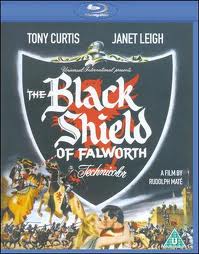
THE BLACK SHIELD OF FALWORTH
US, 1954, 99 minutes, Colour.
Tony Curtis, Janet Leigh, David Farrar, Barbara Rush, Herbert Marshall, Dan O’Herlihy?, Torin Thatcher, Patrick O’Neal?.
Directed by Rudolph Mate.
Another chivalry film which appeared in 1954. Ivanhoe in the early 50s had given audiences a taste for medieval romances and this was common in 1954 with The Black Knight, The Knights of the Round Table, Prince Valiant.
However, this film is set in the times of Henry the Fourth and has an interesting variation on the drunken Prince Hal in the form of Dan O’Herlihy?. The film was made by Universal and used Tony Curtis at a period when he was featured in athletic swashbuckling films. However, the film is in Cinemascope and given lavish treatment as well as a very strong supporting cast including Herbert Marshall as the Duke. English David Farrar is the villain. It features Patrick O’Neal? in a very good role as a villain. Torin Thatcher appears strongly as Sir James. Tony Curtis and Janet Leigh, hero and heroine, were married at the time and had appeared in Houdini. The trappings are lavish and enjoyable but the treatment and style are very much American. The original novel was Howard Fast’s Men of Iron.
1. The popularity of films about England and the Middle Ages? The appeals of Knighthood, action, romance - the English setting? The quality of this particular Hollywood example?
2. The use of Cinemascope especially for action sequences, colour, the Hollywood treatment of the British themes? The stars?
3. The story-book atmosphere of Britain? The King, the Court, loyalty, treachery, fights, romances, enemies being routed and peace being restored? Suitable for this kind of adventure film?
4. The film’s presentation of the 15th century setting? The background of the reign of Henry the Fourth, Prince Hal and his feigning drunkenness and the motivations - against the Duke of Alban? The picture of Alban's treachery? The castles, the tournaments, the knightly themes and codes of honour?
5. The political background and the presentation of the character of the ailing Henry the Fourth? Hal and his double appearance and his loyalty, the Duke of Mackworth and his establishment and the way that he ran it, his loyalty compared with the Duke of Alban and his schemes and men?
6. The title of the film and the mystery about Falworth? Miles and Meg and their heritage and its mystery? Their being taken searching, feeling unjustly treated, their vindication?
7. The suitability of Tony Curtis as Miles? The introduction to him and his defence of his sister and his athletic vigour, his presentation at court and the immediate fight with Sir Walter Blunt and the others, the vigour and roughness of his reaction especially against the Earl of Mackworth? The romance with Lady Anne and the climbing of the wall? His trying to find his identity, for instance in the library? The clashes with Sir James? The gradual training and vigour? His learning of the truth? Defending his honour and fighting? The credibility of a knight going through the ranks of training and avenging family honour?
8. The contract with Sir Walter Blunt and his arrogance, growing hostility towards Miles, courting of the Lady Anne, betrayal and helping of his brother? Prince Hal and his friendship? The world of the Squires in the entourages, styles of training, fights in the dormitory? Sir James and his rule over them?
9. The Earl and his plans? His relationship with Prince Hal, the tearing of the page out of the Book of Heraldry, Sir James and his place in the castle?
10. Anne and Meg as glamorous romantic heroines? Their characters, styles? The romance, Anne riding to victory at the end?
11. The Earl's elaborate trick for getting Miles knighted and for the fight against Walter Blunt in the presence of the King? The generating of some suspense at the end?
12. The atmosphere of tournament, the fierce battle?
13. Audiences absorb popular history like this. How accurate a picture of the past? The codes of the past and themes of honour, masculine attitudes of the Middle Ages, the place of the lady? Violence, romance and heroics?
Published in Movie Reviews
Published in
Movie Reviews
Tagged under
Saturday, 18 September 2021 20:01
April and the Extraordinary World/ Avril et le monde trucque
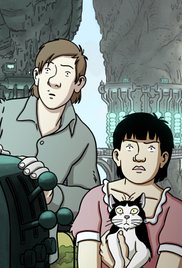
APRIL AND THE EXTRAORDINARY WORLD/ AVRIL ET LE MONDE TRUCQUE
France, 2015, 105 minutes, Colour.
Voices of: Marion Cotillard, Jean Rochefort, Olivier Gourmet, Marc- Andre Grondin, Bouli Lanners, Anne Coesens.
Directed by Christian Desmares, Frank Ekinci.
What’s in an expectation? With the title so pleasing with the word April and the emphasis on extraordinary, this seemed to be a continental version of those delightful Japanese animation films from Studio Ghibli. As the film opened, it was not like that. Not at all.
It is 1870, Napoleon III on the eve of a Franco- Prussian war, going to a scientist to find a serum that will empower soldiers to win the war. But the serum did not achieve that and Napoleon dies and history is forever changed – or at least goes into an alternate world. The animation for the film is a quite striking, dark, often sinister, grim alternate world. But, with a top voice cast led by Maion Cotillard and Jean Rochefort, it is highly dramatic.
In the alternate world, most of the famous scientists, including a very visible Albert Einstein, have disappeared from the ordinary world and have joined The Project, the finding of the serum that would transform all living things, continually renewing them. A fightback begins when the young girl, April, descendant of the family Franklin, all scientists, searches for her parents who have disappeared, recovers contact with her grandfather with the help of a young street boy, Julius.
The important thing is that the young girl, April, has the talent to make the serum – and is pursued by a variety of thugs employed by a couple who, perhaps unfortunately, but sinisterly, are lizards who resemble the mutant Ninja Turtles.
April finds that her father has been imprisoned, that her mother supports The Project, and that there is a plan to transform outerspace by a nuclear explosion that will spread the serum to the moon and other planets. But, human nature being what it is – or, perhaps, lizard nature being what it is, the chief lizard has other, more ambitious, more destructive ideas.
Which builds up some split-second timing to avert disaster, to defeat the lizard, to redeem the young man who has not been entirely honest, and to reassure grandfather, mother and father, that the serum can be created and profitably used if not found in exploitative hands.
Certainly not the sweet animation that might have been anticipated – rather, an adventurous as well is reflective piece of science fantasy.
1. A different kind of animation story? Plots and issues? visual style? An animation for an adult audience?
2. The impact of the visuals, dark, surreal, touches of the grotesque combined with those which were nice? The musical score?
3. The range of voices in the classic French cast?
4. An alternate world, inviting audience imagination, What if…?
5. 1870, Napoleon III, the Franco- Prussian war, the visit to the scientist, Franklin, the serum, Napoleon’s expectations, to win the war, the effect, hopes dashed, Napoleon shooting in the laboratory, his death – and a different future for the world?
6. A different Franco- Prussian War? An alternate timeline for the world, The Project, the disappearance of the scientists, no inventions, a cold and limited world without electricity and other conveniences? The narrative supplying the different dates, 19th century, 20th century, into the 21st century?
7. The professor, his character, the serum? His son and daughter-in-law and their continued investigations? His granddaughter, April, her talent with the serum? The disappearances, father and mother gone?
8. April, her character, the search? The years passing? The encounter with Julius, his background, friendliness, helping April in her quest?
9. The police Inspector, the force, his using Julius, the contact, information about the grandfather and about April? The police Inspector arriving, his being taken and imprisoned?
10. April finding her grandfather, with Julius, discovering Julius’ treachery?
11. The project, the visits, the couple in charge, their experiments, wanting the serum? The construction of the spacecraft? The aim, revivifying space, making planets liveable?
12. The plant, equipment, the workers, the guards and their weapons, the prison, the professor finding his son, the bars to their cell?
13. April, finding her mother, her mother converted to The Project, working for it?
14. April, using her wits, Julius helping, the closing down of the electricity, the grandfather and Paul escaping?
15. The chief lizard, his plan, domination, wanting the serum? April working, Julius and the serum, the container with water, the lizard taking it, drinking it, large, the fight, the revelation of his plan to destroy Earth?
16. The buildup to the final confrontation, the timing, the spacecraft, the serum and enlivening all the plants and growth?
17. The cat throughout the film, experience of the serum, the rat, killed and reviving? His being caught in the rocket, trying to change the elevation, final success? The explosion in space in the transformation? The destruction of the lizard?
18. Happy reunion for the whole family – and the cat?
Published in Movie Reviews
Published in
Movie Reviews
Tagged under
Saturday, 18 September 2021 20:01
Black Souls/ Anime Nere
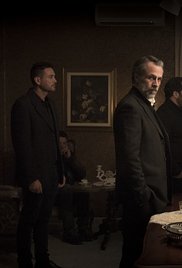
BLACK SOULS/ ANIME NERE
Italy, 2014, 109 minutes, Colour.
Marco Leonardi, Pippino Mazotta, Fabrizio Ferracane, Barbora Bobulova, Giuseppe Fumo.
Directed by Francesco Munzi.
Black Souls has been praised as a different kind of Mafia film. While there were many Italian gangster films, especially in the 1960s and 70s, the norms for Mafia films were set by Coppola’s The Godfather in 1972. The focus is on family, family business, control – with some spectacular scenes of violence.
This is a 21st-century film of the Mafia, comparatively little explicit violence on screen, with the focus on family and family relationships, and family business.
The focus is on three middle-aged sons. Their father had been killed in a dispute. Two of the sons are involved in criminal activity, one, quite suave, the face of the operation while his brother is the brains behind the ventures and exercises quiet control. The third brother has not joined them in the enterprise but stays at home in the south, tending goats, acting as a vet. However, one of his sons decides to leave home and join his uncles, leading to some confrontations and some violence.
1. Mafia story? Family story? Southern Italy? Expansion into Milan and the North?
2. Locations, villages, cities, homes, apartments, the streets? The musical score?
3. The title, the reference to the family, the family members?
4. Visually lower key than many Mafia films, the moments of violence rather than many sequences? The dramatic effect?
5. The family, the headlines about the death of the father? Luigi, the meetings with the Spaniards and other drug dealers? His sexual relationships? His character? Taking on his nephew, Leo? The contrast with Rocco, respectably married, at meetings, the person of caution, behind the scenes, his talent with management and control?
6. Luciano, in the south, the family, his relations with his son, Leo, and Leo and his reckless behaviour, destroying the bar, the shooting, accepting that Leo left to join his uncle’s, his return and Luciano’s insistence that he make peace at the bar? Luciano and his work, the goats, veterinary work?
7. Leo, young, his friends, wanting to make deals, the family, with Luigi, with Rocco? Luigi’s death and his spirit of revenge?
8. Luigi, in his car, the sudden killing in the street? The repercussions for the family?
9. Rocco, management? Luciano arriving, shooting him?
10. A masculine world, the role of the women, wives, support?
11. The 21st century picture of the Mafia?
Published in Movie Reviews
Published in
Movie Reviews
Tagged under
Saturday, 18 September 2021 20:01
Comunidad, La/ Common Wealth
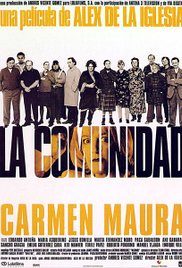
LA COMUNIDAD/ COMMON WEALTH
Spain, 2000, 110 minutes, Colour.
Carmen Maura, Eduardo Antuna, Maria Asquerino, Jesus Bonilla, Terele Pavez.
Directed by Alex de la Iglesia.
Alex de la Iglesia is a Spanish director who has a talent for the offbeat and the comically grotesque. He made one of the ugliest road films, Perdita Durango. In La Comunidad, he brings his wild ideas and style under more control - or, he focuses them better. This means that La Communidad is truly an original.
Carmen Maura is a larger than life Spanish star who has appeared in several of Almodovar's films. She is intense and dominating. Here she plays a woman working for an estate agent who decides to move into one of the apartments she is trying to sell. She has no idea of what she has let herself in for. Neither do we, the audience. So, we follow the crazy happenings in the building (much of which is in a state of collapse, very handy for some of the chases and dangers to come) as she finds a corpse and a huge amount of money. As she tries to get away with it, she learns something of what community solidarity is like. Everyone in the building has a claim - and they take it very seriously. Maura finds herself pursued in lifts, up and down stairs, swinging from buildings, leaping over rooves with various greed driven characters in pursuit. It is all rather breathless, filmed in flamboyant style to show us how a Spanish black comedy can be made.
1. A Spanish black comedy? Real and surreal? The characteristics of the director?
2. The Madrid setting, the old feeling, the interiors, the boom, the attic, the staircases…? The exteriors, the buildings, roofs, …? The musical score?
3. The title, the Spanish focus on the community in the building, the English title and the emphasis on, having the wealth in common, the play on Commonwealth?
4. The possibility of the plot, Julia and her story, the old man dead, the sources of his money, hiding it, 20 years, the greedy members of the apartment block? His death, Julia and her discovery, the reaction of the householders?
5. The theme of greed, Julia herself, her husband and his having been fired? The old man and his walking? The malignant greed of the householders? Putting it into vicious action?
6. Julia, her age, real state, the building, the husband being fired, the different, going into the room, the sexual action, the cockroaches, the collapse and the revelation of the the body?
7. The fireman, going into the room, the cat in the body, corrupt?
8. Julia, the money, the amount, hidden, finding it, wanting to leave?
9. The range of characters in the building : the manager, dominant, his tactics? The man with the Darth Vader mask? The visuals woman, the old ladies… The 15 characters?
10. Their behaviour, the tactics, killings, violence?
11. The pursuit of Julia, her going onto the roof, the bizarre happenings in chases, the Darth Vader man…?
12. The tone of the Indian? Julia – any change of heart? The householders?
Published in Movie Reviews
Published in
Movie Reviews
Tagged under
Saturday, 18 September 2021 20:01
feardotcom
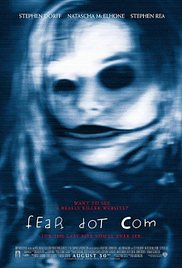
feardotcom
UK/Luxembourg 2002, 101 minutes, Colour.
Stephen Dorff, Natasha Mc Elhone, Stephen Rea, Udo Keir, Jeffrey Coombs, Nigel Terry, Michael Sarrazin.
Directed by William Malone.
A good title for a horror-thriller. And the settings are eerie (all filmed in Luxembourg, offering different views for the US). But, the plot is very difficult to follow, something about people who log on to a fear website finding that they will be killed within 48 hours (something like The Ring and people who watch a video getting a call threatening them with death within a week).
Part of the complication is that there is a dead girl who wants vengeance and she is linked in with a mad (very mad) doctor who has killed her and is a serial killer with autopsy skills. Added to that are the two main characters, a weary young policeman whom the serial killer taunts and a health inspector who is called to the scene of one of the deaths. They team up, discover what happens when you log on. He does, although warning her not to. She does. And she has to find the doctor.
At least, I think that that is more or less what it is about. Stephen Dorff is the policeman, Natasha McElhone? the health inspector and Stephen Rea being madder than mad as the doctor. It looks very effective, has eerie atmosphere but does not make all that much sense.
1. A horror thriller? Virtual reality and the Internet? Blood and gore?
2. The New York settings, filmed in Luxembourg? The police, the health inspector, the finale in the warehouse, inside virtual reality? The musical score?
3. The title, the website, on the keyboards, the effect of logging in to the website, violence and mania, mayhem, leading to death?
4. The girl, within the website, the mad scientist, control? Destroying him by entering into the website?
5. The detective, his previous case unsolved, the death of the girl, the further murders, his investigation, concern, getting the health inspector, the rapport between the two, romance, following through, the discoveries, the confrontation of the killer, the warehouse?
6. The health inspector, the background, involved in the case, the relationship with the Detective?
7. The associate characters, the detective’s assistant, the victims?
8. The finale, the confrontations, the number of deaths – and the pessimistic ending?
Published in Movie Reviews
Published in
Movie Reviews
Tagged under